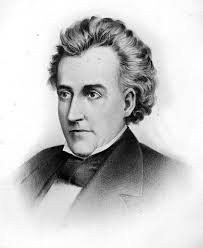Get Today in Masonic History into your Inbox. Sign up today for one of our email lists!
Need an article for your Trestleboard/Newsletter see our Use Policy
Daniel Dunklin Passes Away

Today in Masonic History Daniel Dunklin passes away in 1844.
Daniel Dunklin was an American politician.
Dunklin was born on January 14th, 1790 in Greenville, South Carolina. In 1805, Dunklin's father purchased land with intention of moving the family to Caldwell County, Kentucky. His father passed away before the family moved. The year after his father's passing, Dunklin, his brother and mother moved to the new land. The teenage Dunklin tried his had at farming and was not very successful. During this time he read whatever he books he found about the law hoping to become a lawyer.
In 1810, Dunklin moved again with his mother to the Louisiana Territory, it became the Missouri Territory two years later, settling in Potosi. During the War of 1812, Dunklin served with the Missouri Milita. In 1815 he traveled back to Kentucky to marry his childhood sweetheart after becoming a frontier lawyer in Potosi and other places in the region.
It was also in 1815, Dunklin held his first public office. He was appointed as Sheriff of Washington County. Holding the position until 1821. During this period, Dunklin was a delegate to the Missouri Constitutional convention in preparation of Missouri becoming a state. Later he was elected to the Missouri House of Representative, and in 1828 as Lieutenant Governor.
In 1832, Dunklin was elected the fifth Governor of Missouri. He was a Jackson Democrat and an "Old Guard" Jeffersonian. He favored states rights in most of the items he pushed forward during his term. He also was a large proponent of public education and laid the ground work for the University of Missouri to be created.
Dunklin's most controversial event involved the Mormons. During his term Joseph Smith had moved his followers to Missouri and proclaiming they intended to create the City of Zion in the state. This caused great conflict in the county where the Mormons had settled and the Mormons were eventually driven out of the county into another part of Missouri. Smith reached out Dunklin and asked him to provide protections for the Mormons. Dunklin replied in 1833 letter:
"make a trial of the efficacy of the laws; the judge of your circuit is a conservator of the peace. If an affidavit is made before him by any of you, that your lives are threatened and you believe them in danger, it would be his duty to have the offenders apprehended and bind them to keep peace."
The Mormon issue out lived Dunklin's administration by three months when his successor issued what is known as "The Extermination Order" which declared the Mormons living in the state as enemies of Missouri and they needed to be either driven out or exterminated.
Dunklin left the Governor's office in 1836 when he was appointed as Surveyor General for Missouri and Illinois. He held the position for four years and surveyed nearly all of the counties south of the Missouri River. He also worked to on a commission to settle the Missouri-Arkansas border.
In 1840, Dunklin sold off much of his land in Potosi and moved to Herculaneum, Missouri. There he was caught in a massive rain storm while working in the field. This caused him to get pneumonia and he passed away on August 25th, 1844.
Dunklin was a member of Tyro Lodge No. 12 in Caledonia, Missouri. The lodge where he recived his degrees is not clear. It is believed he joined a lodge in Potosi, Missouri in a lodge chartered under the Grand Lodge of Kentucky.
This article provided by Brother Eric C. Steele.

